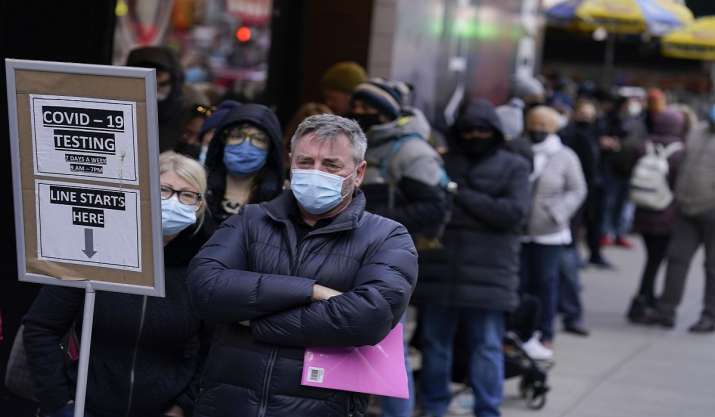
People wait in line at a COVID-19 testing site in Times Square, New York
Highlight
- The WHO said on Sunday that the omicron variant of Kovid-19 has been identified in 171 countries.
- The global health body said that Omicron is set to replace Delta globally soon.
- The WHO said existing evidence suggests the overall risk associated with Omicron is very high.
The World Health Organization (WHO) said that the omicron variant of Kovid-19 has been identified in 171 countries. In its latest technical brief, the global health body said that Omicron is set to replace Delta globally soon as a result of its immunosuppressive capability. It states that the Omicron has been found to have a significant growth advantage, a higher secondary attack rate, and a higher observed breeding number compared to the Delta.
“As of January 20, the Omicron variant has been identified in 171 countries. The variant has rapidly overtaken delta in most countries, leading to an increase in cases across all regions.” Omicron has a substantial growth advantage over Delta, and it is rapidly changing Delta globally,” Brief said.
The global health body said there is “significant evidence” to show that immune evasion contributes to the rapid spread of omicrons. However, the WHO stated that more research is needed to better understand the relative contribution of intrinsic increased communicability and immune evasion in explaining transmission dynamics.
Although infections caused by the highly infectious strain are thought to be mild, the WHO said current evidence suggests that the overall risk associated with omicrons is very high and that its community prevalence is much higher than previous COVID variants.
There has also been a significant increase in hospitalizations due to high levels of transmission, despite having a lower risk of serious illness and death after infection than previous SARS-CoV-2 variants.
The global health body said it places huge demands on health care systems in most countries, and can cause significant morbidity, especially in vulnerable populations.
The WHO also found “evidence that the Omicron variant infects human bronchus tissue faster and more efficiently than the delta”. However, it has shown a predominance of viral replication in the upper respiratory tract, in contrast to the delta.
In addition, the technical brief also mentions the growing presence of Omicron sub-versions. While the BA.1 lineage has previously been most prominent, recent trends in India, South Africa, the UK and Denmark suggest that the BA.2 ratio is increasing, the WHO said.
It said the drivers of the transmission and other assets of the BA.2 are being investigated, but to date this is unclear. The WHO brief said, “Studies are needed to better understand the properties of Ba.2, including comparative assessments of Ba.2 and Ba.1, for key characteristics such as transmissibility, immune escape and virulence. “
Read also: Omron version in community transmission phase in India, major in many metro cities: INSACOG
,